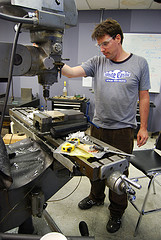Question by Champion: In what approaches are MACHINE SHOP’S price effective?
What other factors do machine shops have to provide for their consumers?
Greatest answer:
Answer by Mr. Smartypants
Machine shops are normally competitive. I imply, when a organization needs a run of components made, they usually send out RFQs (Request for Quote) to many machine shops and go with the lowest estimate. So the shops themselves have to figure out methods to do factors more affordable with no sacrificing top quality. This includes finding clever ways to optimize the method, doing the job in fewer measures or much less time, and also maintaining up with machine technology with the most time-efficient machines.
Machines these days are all CNC (pc numerical manage), so if the very first part comes out proper you can bet all the rest of the parts will be practically identical. Once you get a handle on the ‘machine capability’ i.e. precision, accuracy, repeatability, and so on., of a machine, you can guarantee statistically that all the components will be within spec. The modern ‘enlightened’ method is not to obtain good quality by way of sorting but by means of process capability. Or as they say ‘You can’t inspect good quality into a part’. High quality and expense efficiency are two sides of the exact same coin.
Some machine shops will aid their buyers with engineering a distinct part. For instance, a part that is reproduced in wonderful numbers may be made less costly from an extrusion or a casting rather of machining from a strong chunk of metal. Machine shops may possibly style and create fixtures for machining, inspection, testing, and so on. And for some processes, like progressive die stamping, the buyer has no concept how the element can even be created, so the machine shop lays out the entire approach and tells the client what is needed, then builds the tooling. Machine shops can even style particular packaging for delicate components that want protection in shipping.
Ultimately, machine shops these days are tasked far more and more with ‘secondary operations’. Plating and anodizing, assembly, labeling, marking, and engraving, and so forth., plus specialized things the shop cannot do itself like honing, ‘gun-drilling’, etc. Clients used to move components about to shops that did these ‘second ops’ but now they want to buy a completed part or assembly from an outside supplier.
Know far better? Leave your personal answer in the comments!
